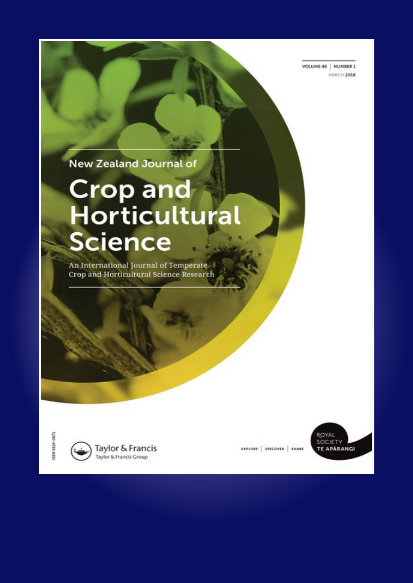采后园艺:一个多学科的科学领域,使全球新鲜农产品贸易
IF 1.5
4区 农林科学
Q3 AGRONOMY
New Zealand Journal of Crop and Horticultural Science
Pub Date : 2022-05-18
DOI:10.1080/01140671.2022.2076639
引用次数: 0
摘要
新西兰处于独特的地位,同时也是发达国家的独特之处,因为经济成功的主要部分依赖于向世界生产和销售粮食。1881年,达尼丁号从新西兰向英国运送了第一批冷冻肉,这表明了处于技术前沿的重要性,以开发和运营易腐产品的供应链。因此,新西兰的采后科学家已经并将继续为支持园艺产业以及供应链中具有固有生物变异性的活呼吸产品所带来的独特额外挑战做出重要贡献。随着新西兰园艺生产的迅速扩大,以及减少肉类和动物产品消费的社会驱动因素,对采后园艺技能和技术的需求,以确保产品满足消费者的需求,仍然一如既往地重要。收获后科学本身代表了广泛的科学技能基础,允许多个学科解决问题和生成知识。采后问题的研究范围从生理学(如基因信号、代谢组学和细胞壁降解)到技术(如适当的成熟度定义、大气操作、热处理等)再到工程(如分拣和包装技术、冷链设计和数学预测系统)。采后科学领域的每一个组成部分都在识别问题的原因、缩小机制范围以及设计尽可能最好地解决问题的解决方案方面发挥着作用。新冠肺炎疫情对社会产生了许多影响。对科学家来说,一个非常明显的影响是,我们无法带着与自己同样的智力激情旅行和会见同事。特别是2020年将是新西兰采后科学的旗舰年,该领域最重要的会议ISHS采后研讨会将于2020年11月在新西兰罗托鲁瓦举行。不幸的是,会议被推迟到2024年(https://www.scienceevents.co.nz/采后2024)。2021年在北帕默斯顿的梅西大学举行的两年一度的植物科学中心在疫情期间是一个显著的解脱。新西兰严格的边境管制和消除政策导致社区在很长一段时间内没有病例,并为新西兰的植物科学家创造了一个独特的机会,让他们能够聚在一起,分享他们的工作,享受科学和社会讨论。这期特刊是从这次会议和疫情失去机会的事实中衍生出来的,尤其是对我们早期的职业同事来说,与他们所选领域的其他专家建立关系是他们职业发展的重要组成部分。这期特刊由一组作品组成,其中一些作品在2021年植物科学中心发表,另一些则独立于会议提交。十二(12)篇高质量的论文是呼吁发行采后特刊的结果。本文章由计算机程序翻译,如有差异,请以英文原文为准。
Postharvest horticulture: a multidisciplinary science field that enables global fresh produce trade
New Zealand is located in a unique position, while also being unique for developed countries in that a major part of the economic success relies on the production and sale of food to the world. The first shipment of frozen meat from New Zealand to the United Kingdom in 1881 by the ship Dunedin signalled the importance of being at the cutting edge of technology in order to develop and operate the supply chains of perishable products. As such, postharvest scientists within New Zealand have and continue to make important contributions to support horticultural industries, and the unique additional challenges in the supply chain that occurs when you have a live respiring product with inherent biological variability. With rapidly expanding horticultural production within New Zealand and societal drivers to reduce meat and animal product consumption, the need for postharvest horticulture skills and technologies to ensure that products meet consumer’s needs, remains as important as ever. Postharvest science in itself represents a wide scientific skill base allowing the solutions to problems and the generation of knowledge to occur from multiple disciplines. Work presented in postharvest problems ranges from physiology (e.g. gene signalling, metabolomics and cell wall degredation) to technology (e.g. appropriate maturity definition, atmospheric manipulation, heat treatments, etc.) to engineering (e.g. sorting and packaging technologies, cool chain design and mathematical prediction systems). Each component of the postharvest science field plays a role in identifying the causes of problems, narrowing in on the mechanisms and designing solutions to solve the problem as best as possible. The Covid19 pandemic has had many impacts on society. One very noticeable effect on scientists was the inability to travel and meet our colleagues with the same intellectual passions as our own. In particular 2020 was to be a flagship year for postharvest science in New Zealand, with the return of the ISHS Postharvest Symposium, the most important conference of the field, to be held in Rotorua, New Zealand in November 2020. Unfortunately, that was not to be, with the conference delayed until 2024 (https://www.scienceevents.co. nz/postharvest2024). The biannual Plant Science Central held at Massey University in Palmerston North in 2021 was a notable relief in the midst of the pandemic. New Zealand’s tight border controls and elimination policy had led to no cases in the community for a prolonged period and created a unique opportunity for New Zealand-based Plant Scientists to be able to come together, share their work and enjoy the science and social discussions. This special issue was spun out of this conference and the fact that opportunities had been lost over the pandemic, especially for our early career colleagues, where the formation of relationships with other experts of their chosen field is an important part of their career development. This special issue comprises of a group of works, some of which were presented at Plant Science Central 2021, while others were submitted independently of the conference. Twelve (12) high-quality papers are a result of the call for the formation of a postharvest special issue.
求助全文
通过发布文献求助,成功后即可免费获取论文全文。
去求助
来源期刊
CiteScore
2.90
自引率
7.70%
发文量
54
审稿时长
>36 weeks
期刊介绍:
Scope of submissions: The New Zealand Journal of Crop and Horticultural Science publishes original research papers, review papers, short communications, book reviews, letters, and forum articles. We welcome submissions on biotechnology, entomology, plant nutrition, breeding and pathology, postharvest physiology, soil science, viticulture, biosecurity, new crop and horticultural products, and descriptions of new cultivar releases. The journal welcomes work on tree and field crops, and particularly encourages contributions on kiwifruit, apples and wine grapes.

 求助内容:
求助内容: 应助结果提醒方式:
应助结果提醒方式:


